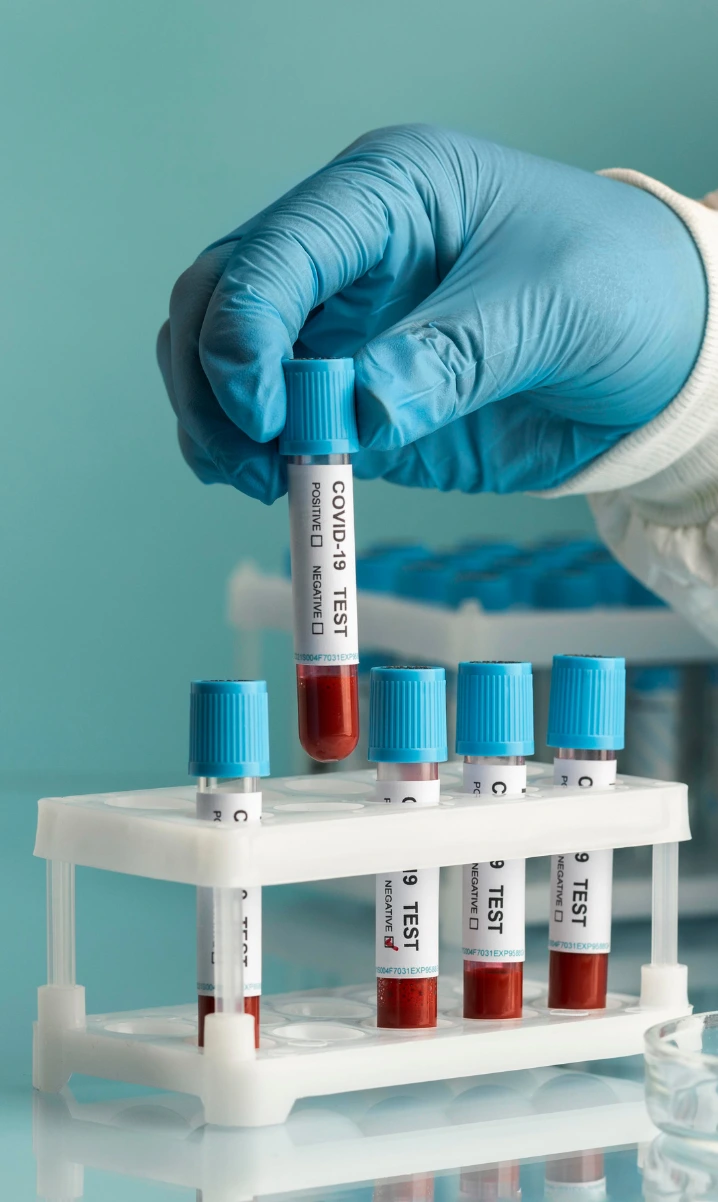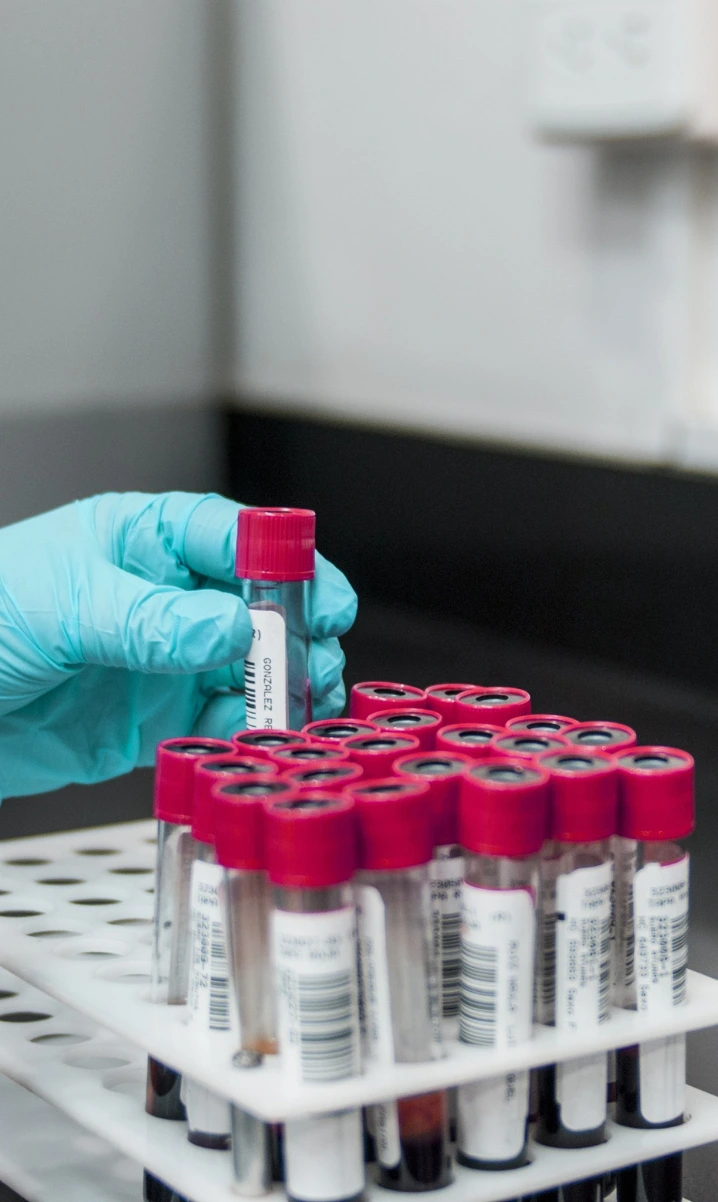While the majority of individuals may consider infertility to be a woman’s issue, it involves both partners to attain a pregnancy. As per the American Society for Reproductive Medicine (ASRM), more than half of infertility instances are due to women’s infertility, the remaining cases are related to male issues, and others are due to disorders associated with both sides or unidentified problems.
While an expert gynecologist can execute some primary tests on females, you will be required to consult a healthcare provider specialized in infertility testing i.e. reproductive endocrinologist or a male infertility expert like urologist for more comprehensive, and modern fertility tests.
At-home fertility tests for females usually imply assembling a small blood specimen and then transferring it to a clinical lab for trials. These trials consider different hormones, including:
The luteinizing hormone (LH) is involved in instructing the ovaries to produce a mature egg. This process of egg release is referred to as ovulation. A pituitary disorder or polycystic ovarian syndrome can lead to high levels of LH. Less amount of LH can be an indication of a pituitary or hypothalamic issue and is mostly observed in females who undergo an eating problem, overdo exercises, or face extra stress.
Follicle stimulating hormone encourages egg development during the menstrual cycle. FSH levels become high with growing age in women. As a woman matures, her egg count becomes less. High levels of FSH might indicate that your ovarian reserve is diminished.
Fertility experts can suggest blood trials for AMH at different times during the menstrual cycle. The anti-Mullerian hormone is the most sensitive hormone marker for accessing reproductive potential. It is released by the cells (granulosa cells) that maintain pre-mature and developing eggs. Both -the granulosa cells and AMH amount- decrease as egg count lowers over time. The AMH values also suggest the ovaries’ response to fertility injection drugs, which can guide your gynecologist to design the IVF procedure accordingly.
Transvaginal ultrasound is performed by calculating the follicles number (four to nine millimeters) of both ovaries between the third and twelfth day of your period. The eggs collected during these specific days have full potential for fertilization and development. If you are low in follicle count, you may experience egg quantity and quality problems.
FragileX
Hysteroscopy
Karyotype (Chromosome trial performed on blood specimen)
Testosterone
Laparoscopic (Surgical procedure for intra-pelvic area)
17-Hydroxy-Progesterone
Fasting Blood Glucose levels
Insulin (For PCOS individuals)
Being a guy–if you are finding the pregnancy accomplishment of your partner to be difficult, decide on a consultation visit to your doctor. There are various tests you can participate in to identify fertility status — and know about what treatment options you have access to.
The meeting with a doctor initiates by physical evaluation and enquiring questions about your daily routine and medical history, including the following:
1. Medical history
2. Medical drugs you take
3. Your physical activities habits
4. Do you smoke or habitual of taking recreational drugs
There may also be a comfortable tone of discussion related to problems with your intercourse and other sexually transmitted disorders.
It can identify varicoceles — the abnormal appearance of veins around the testicle. You can remove this problem with surgery.
Hormonal evaluation is necessary as primary hormones like testosterone control the production of sperm. However, the fact must be considered that hormones are not a major issue leading to infertility in men in almost 97% of individuals.
It can recognize specific blockages in fertility and issues with your sperm. Experts have different opinions on the time period of genetic test recommendations.
A smooth catheter is injected into the rectum that allows your doctor to analyze the prostate and identify any obstructions throughout the channels that migrate sperm.
1. Karyotype (Chromosome trials performed on blood specimen)
2. Sperm Chromatin Separation Assay ( for Sperm test)
3. Hormonal Tests: most prominently FSH, Prolactin, Testosterone, Estradiol (blood tests performed for identification of severe male parameters)
4. Y-Chromosome microdeletion DNA test (Blood test)
Fertility tests for men usually consist of a sperm analysis, which can recognize the development and health of an individual’s sperm.
A trained professional will analyze your sperm movement, count, appearance, and other characteristics. Generally, if the value of normal-shaped sperm is high, it concludes you have a greater fertility chance. But exceptional cases are always there. A number of male individuals having lesser sperm counts or unusual semen still show fertility. Whereas almost 15% of infertile individuals have usual semen and excess of normal sperm.
If the results of the first test show normal values of semen analysis, your healthcare expert may recommend a second test for further confirmation of the results. Two normal tests generally suggest you don’t possess any prominent infertility problems. If there is something unusual in the final results, the doctor might ask to perform other tests to identification of the problem.
If you miss the semen or sperm completely, it might be a consequence of the blockage in your reproductive organs that can be fixed with surgical procedures.
Male fertility testing is a simple approach that demands in-depth diagnosis. By analyzing the following factors during semen testing, a fertility expert can identify the underlying source of fertility disorders.
A semen analysis focuses on several factors, the most prominent among them are as follows:
Concentration involves the assessment of the number of sperm that are ejaculated. When sperm is low in concentration(called oligozoospermia), the hope for sperm to approach an egg in the female’s fallopian tubes decreases from less to none.
Motility of sperm consists of sperm quantity that migrates and the pattern of their movement. Few sperm, for instance, may travel in zigzags or circles. Moreover, the term asthenozoospermia is used for sperm motility disorders. Your motility lies in normal levels if sperms greater than 32% are moving.
Our ability to perform at-home diagnostic tests and provide relative treatment has rapidly advanced over time. Having a comprehensive and appropriate diagnosis is necessary to look for accurate treatment or therapy for you.
Our customized at-home lab services provide an extensive range of lab-tests like allergy, hormone testing, hbA1c etc that are performed by DHA-licensed nurses. The licensed team of Vesta Care can reach you within 30 minutes and collect blood samples. We offer several diagnostic trials and free Doctor Consultation that can initiate your treatment process.


Our one-stop solution for medical laboratory tests at home in Dubai integrates the clinical assessment, diagnosis, and treatment cycle anywhere in Dubai within minutes from your call.
Our focus is in on outstanding accuracy and clinical compliance coupled with fast availability and affordability.













We execute any custom prescription from your doctor upon request.
We are fully licensed to issue e-prescription for medicine and arrange the delivery of your medication.
In females, there can be various elements that could affect fertility. Some of them are described below:-
Being a guy–if you are finding the pregnancy accomplishment of your partner to be difficult, decide on a consultation visit to your doctor. There are various tests you can participate in to identify fertility status — and know about what treatment options you have access to.



Our medical team and our referral medical laboratory are working 24/7 for 365 days in any year and are both located in Dubai. Your samples are collected and transported around the clock within the DHA guidelines for sample transportation and storage and the tests are executed, in-house and in Dubai. We perform these services in-house and in Dubai and these are the factors that guarantee our results turn-around times!
Your results are validated by our Clinical Pathologists and Laboratory technicians and clinically correlated before being released by our Medical Laboratory in Dubai. Your reports will be indicating the ranges as well as the meaning of this ranges in accordance with quality accreditation requirements. Still, us not being intermediaries, our Doctors and clinicians are available to you for a medical evaluation of your results or cover any queries and concerns you might have.
We are a DHA licensed medical provider, equipped with the required approvals to perform these services while our medical staff is licensed by DHA and trained to perform these services. Additionally, our medical laboratories are Licensed and Accredited to perform these tests, in compliance with highest international clinical standards. These two, safeguard the end-to-end compliance, accuracy and reliability of the testing at Home.
Simply, we do not rely on intermediaries. We own and operate ALL assets involved in the process, end-to-end. From our direct patient CRM, to our licensed sample collection facilities and the analysis in our affiliated medical laboratory. We are clinicians we over 20 years presence in the community.
There can be substantial health hazards of performing medical acts without involving a licensed medical facility with licensed practitioners. We, at Vesta Care, carry all the required licenses, trained and licensed medical staff, as well as the required insurances to ensure a smooth experience and clinically robust medical act, bringing standards that are followed by the world’s most reputable facilities, are accredited by quality bodies and licensed by the local authority in Dubai.
There are several options to manage fertility issues in females. In some cases, both partners require treatment for infertility disorders. The most common approaches used by doctors include
1. Surgical procedures
2. Lifestyle modifications
3. Hormonal therapies
4. Medications
Couple fertility tests include the following tests:
For female partner:
1. Anti Mullerian Test
2. Pelvic ultrasound
For male partner:
1. A semen report and analysis
Most fertility tests are non-surgical or minimally invasive techniques. They do not demand surgery. For instance, ovulation tracking tests involve monitoring periods. Hormonal assessment is done through blood specimens whereas semen analysis requires semen samples.
Generally, male and female fertility tests are safe to perform with no reported side effects. However, a little discomfort may be associated with a few fertility procedures.
If you are a woman, still finding it difficult to conceive till age above 35, it must not be delayed further to consult a doctor for fertility tests.